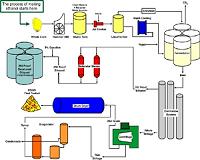 |
Kuala Lumpur, Malaysia (UPI) Feb 3, 2011 Massive draining of Malaysia's peat swamp forests for palm oil production could lead to the complete loss of forests in the state of Sarawak by the end of this decade, a study warns. The study shows that from 2005-10, almost 10 percent of Sarawak's forests and 33 percent of its peat swamp forests were cleared, 65 percent of which was for palm oil production. For the rest of Asia, the deforestation rate during the same period was approximately 3.5 percent. Commissioned by Netherlands environmental group Wetlands International, the report relied on satellite data analyzed by SarVision, a remote sensing firm also based in the Netherlands. Malaysia, the world's second-largest palm oil producer, accounts for 45 percent of the world's palm oil production. Aside from the global increase in demand for vegetable oil, Wetlands International cited initiatives in Europe to increase the use of biofuel for spurring the massive expansion of the plantations. The Malaysian government claims that 8 to 13 percent of all Malaysian palm oil plantations are on former peat swamps. In Sarawak, the government estimates that it is 20 percent. The SarVision and Wetlands International studies, however, suggest that 20 percent of all Malaysian palm plantations are situated on drained peat swamps and 44 percent of Sarawak's palm plantations are on former peat swamp forests. "Official Malaysian government figures now appear to have given a far too optimistic picture of the situation," the report states. The report estimates that 1,260,237 acres of peat lands were drained in Malaysia last year for the production of palm oil, leading directly to the release of 20 million tons of carbon dioxide. "Free availability of satellite imagery and tools such as Google Earth are revolutionizing forest monitoring," said Niels Wielaard, a senior project manager with SarVision. In a news release, Wetlands International called for a ban on palm oil production on peatlands and for a halt on further conversion of natural areas for the crop. Malaysian Prime Minister Najib Razak defended the country's sustainable development policies, saying that government policies ensure a balance of taking care of its citizens' needs while conserving forest areas. "We need to provide space to accommodate a better life for Malaysians but at the same time, areas developed for oil palm cultivation must be based on sustainable development," the prime minister said Saturday, in response to reporters' questions about excessive palm oil production, national news agency Bernama reports.
Share This Article With Planet Earth
Related Links Bio Fuel Technology and Application News
 Celanese Signs LoI For Ethanol Production Facilities In China
Celanese Signs LoI For Ethanol Production Facilities In ChinaZhuhai, China (SPX) Jan 21, 2011 Celanese has announced that its wholly owned subsidiary, Celanese Far East Limited, has signed letters of intent to construct and operate industrial ethanol production facilities in Nanjing, China, at the Nanjing Chemical Industrial Park and in Zhuhai, China, at the Gaolan Port Economic Zone. Pending project approvals, Celanese could begin industrial ethanol production within the next 30 m ... read more |
|
| The content herein, unless otherwise known to be public domain, are Copyright 1995-2010 - SpaceDaily. AFP and UPI Wire Stories are copyright Agence France-Presse and United Press International. ESA Portal Reports are copyright European Space Agency. All NASA sourced material is public domain. Additional copyrights may apply in whole or part to other bona fide parties. Advertising does not imply endorsement,agreement or approval of any opinions, statements or information provided by SpaceDaily on any Web page published or hosted by SpaceDaily. Privacy Statement |